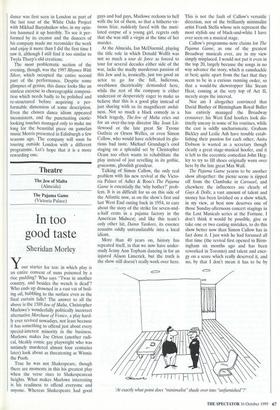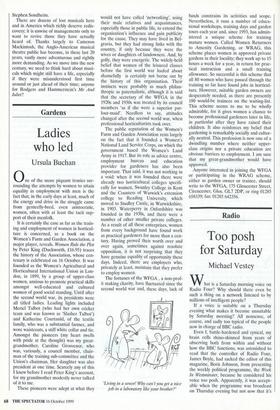Theatre
The Jew of Malta (Almeida) The Pajama Game (Victoria Palace)
In too good taste
Sheridan Morley Your starter for ten: in which play is an entire convent of nuns poisoned by a rice pudding? Who says "Twas in another country, and besides the wench is dead'? Who ends up drowned in a vast vat of boil- ing oil, bubbling to the surface even as the final curtain falls? The answer to all the above is the 1589 Jew of Malta, Christopher Marlowe's wonderfully politically incorrect alternative Merchant of Venice, a play hard- ly ever revived nowadays, not least because it has something to offend just about every special-interest minority in the business. Marlowe makes Joe Orton (another radi- cal, bleakly comic gay playwright who was untimely murdered almost four centuries later) look about as threatening as Winnie the Pooh.
True he was not Shakespeare, though there are moments in this his greatest play when the verse rises to Shakespearean heights. What makes Marlowe interesting is his readiness to offend everyone and anyone. Whereas Shakespeare had good guys and bad guys, Marlowe reckons to hell with the lot of them, so that a hitherto vir- tuous friar, suddenly faced with the muti- lated corpse of a young girl, regrets only that she was still a virgin at the time of her murder.
At the Almeida, Ian McDiarmid, playing the title role in which Donald Wolfit was not so much a tour de force as forced to tour for several decades either side of the war, lacks the madly murderous passion of this Jew and is, ironically, just too good an actor to go for the full, ludicrous, overblown theatricality demanded here, while the rest of the company is either undercast or desperately eager to make us believe that this is a good play instead of just sharing with us its magnificent awful- ness. Not so much a black comedy as a black tragedy, The Jew of Malta cries out for an over-the-top director like Joan Lit- tlewood or the late great Sir Tyrone Guthrie or Orson Welles, or even Simon Callow, who would have celebrated its glo- rious bad taste. Michael Grandage's cool staging on a splendid set by Christopher Oram too often wants to rehabilitate the play instead of just revelling in its gothic, gruesome, ghoulish grandeur.
Talking of Simon Callow, the only real problem with his new revival at the Victo- ria Palace of Adler & Ross's The Pajama Game is essentially the `why bother?' prob- lem. It is as difficult for us on this side of the Atlantic now, as on the show's first and last West End outing back in 1954, to care about the story of the strike for seven-and- a-half cents in a pajama factory in the American Midwest; and like this team's only other hit, Damn Yankees, its essence remains oddly untranslatable intn a local idiom.
More than 40 years on, history has repeated itself, in that we now have under- study Jenny Ann Topham dancing in for an injured Alison Limerick, but the truth is the show still doesn't really work over here. This is not the fault of Callow's versatile direction, nor of the brilliantly minimalist artist Frank Stella whose sets represent the most stylish use of black-and-white I have ever seen on a musical stage.
Callow's programme-note claims for The Pajama Game, as one of the greatest Broadway musicals ever, are in my view simply misplaced. I would not put it even in the top 20, largely because the songs in no way advance the story, which is ramshackle at best; quite apart from the fact that they seem to be in a curious running order, so that a would-be showstopper like Steam Heat, coming at the very top of Act II, merely stops the interval.
Nor am I altogether convinced that David Bintley of Birmingham Royal Ballet has entirely managed the Broadway crossover: his West End hoofers look dis- tinctly uneasy in some of his routines, while the cast is oddly uncharismatic. Graham Bickley and Leslie Ash have trouble estab- lishing their passion for each other; Anita Dobson is wasted as a secretary though clearly a great stage-musical hoofer, and it is left to the eccentric comedian John Heg- ley to try to fill shoes originally worn over here by the late great Max Wall.
The Pajama Game yearns to be another show altogether: the picnic scene is ripped off from the Clambake in Carousel, and elsewhere the influences are clearly of Guys & Dolls; a vast amount of talent and money has been lavished on a show which, in my view, at best now deserves one of those Sunday-afternoon concert stagings in the Lost Musicals series at the Fortune. I don't think it would be possible, give or take one or two casting mistakes, to do this show better now than Simon Callow has in fact done it. I just wish he had focussed all that time (the revival first opened in Birm- ingham six months ago and has been reworked in Toronto) and talent and ener- gy on a score which really deserved it, and no, by that I don't mean it has to be by At exactly what point does "minimalist" shade over into "unfurnished"?' Stephen Sondheim.
There are dozens of lost musicals here and in America which richly deserve redis- covery; it is unwise of managements only to want to revive those they have actually heard of. Thanks largely to Cameron Mackintosh, the Anglo-American musical theatre public has become, in these last 20 years, vastly more adventurous and rightly more demanding. As we move into the new century, we need to think hard about musi- cals which might still have a life, especially if they were misunderstood first time around or just ahead of their time; anyone for Rodgers and Hammerstein's Me And Juliet?



















































































 Previous page
Previous page